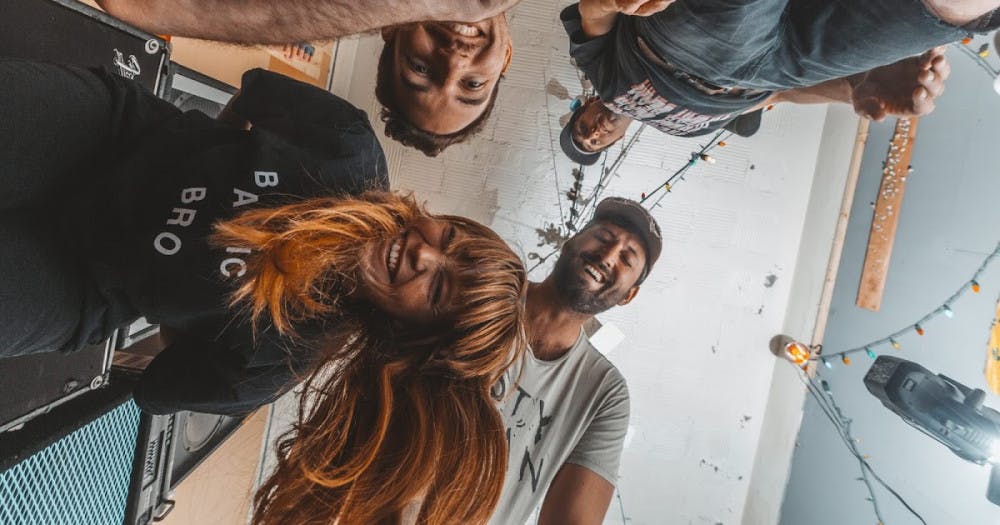A few days before Culture Shock, I sent some questions to Melkbelly, the excellent noise-rock quartet that headlined the festival. Frontwoman and lyricist Miranda Winters wasn’t able to get back to me until a couple hours before Melkbelly’s set, during which an oval in front of the middle of Rhino’s Youth Center's stage became a mosh pit. Moshing is a complicated convention at rock performances. It shows the band that some listeners find their music conducive to catharsis, but the catharsis manifests in violence that impacts people who didn’t consent to being pushed, or being displaced to a spot it may be harder to see the musicians from. One of the downsides of moshing during a Melkbelly set, though, affected the moshers: their physical exertion temporarily prevented them from watching the physical feat that is James Wetzel’s drumming––a constant, intricate force both live and on Melkbelly’s debut album. Nothing Valley came out last year, not incidentally, on Friday the 13th. Before Miranda answered my questions (Miranda shares her last name with two of her bandmates––her husband Bart, who plays guitar, and Bart’s brother Liam, who plays bass), I might’ve thought that, were mosh pits in Nothing Valley, she would’ve meant to present them as sinister spaces. I might’ve been wrong.
Sadie Dupuis, Speedy Oritz’s frontwoman, released Nothing Valley on Wax Nine, the subsidiary of Carpark Records she runs. Besides cryptic lyrics and dissonance, what are some stylistic similarities between Speedy Ortiz and Melkbelly?
I’d say that those two things, cryptic lyrics and dissonance, really cover a lot of our sameness, but I would add that both bands like to play loud live and really enjoy guitar riffs.
Nothing Valley, if I’m not mistaken, thematizes cultish behaviors. The first chorus on the album’s closer, “Helloween,” begins, “Traditional circles in the woods.” The titular character of the preceding track, “Cawthra,” was “blindfolded and forced to stay / up late to recite some / poems.” These more outlandish scenes come after “Kid Kreative,” a song that can be interpreted as a scoff at artsy breakfast posts on Instagram, and “Twin Looking Motherfucker,” which locates some people who look and act and speak identically at festivals. What drew you to the cultish as a concept for an album? And did you want to invite your listeners to consider how the seemingly innocuous trends they follow may be sinister?
We are writing from life because being in a band is like being in a cult. Just kidding! Sort of! The way that humans function in groups is something that interests us (parties, cults, frats, bands, shows, etc.) because when you travel often and play shows, you get to see this stuff night after night, but it's never the same.
The response to your second question is its inverse. In the songs that tackle these themes more up front (like “Cawthra” and “Helloween”), I wanted listeners to see that things they might think are sinister are actually harmless. Like mall goths.
Miranda, something I’ve noticed about your singing on Nothing Valley is that you rarely give a syllable more than one note. The syllables that get more than one note are often very brief glissandos. Do you sing this way to contribute to the album’s unsettling atmosphere?
In Melkbelly there are 4 instruments doing a lot of shit that you can’t always immediately latch onto, and I suppose that’s why I attempt more even-keeled vocals; it’s something to grab onto. Also, the volume and tone of our instrumentals, loud and sharp, contrast well with dark notes and intimate levels of speaking.
“R.O.R.O.B.”’s second verse has a line in which the speaker asks to be picked up from a tide pool. Shortly after you play the second verse for the last time, guitars hold some awfully heavy chords for about a couple seconds, over and over again, in a staccato rhythm. I get the sense that it wouldn’t be easy to pull the speaker out of whatever world their head’s in. And in “Helloween,” James’s cyclic drumming literalizes a circle in the woods. When you’re writing songs, to what extent do you try to reinforce a song’s lyric with its music, or vice versa?
Fairly often––not all the time but a lot of the time. When I write a melody on the guitar, it's usually in response to a lyric or vocal melody that already exists, so the tone has been set. If I give a semi-finished piece of a song to the band, I think they hear that and write accordingly. When a song part is written by someone else, I write lyrics in response to that tone or pace or shape.
In Steven Arroyo’s review of Nothing Valley for Pitchfork, he claims “Kid Kreative” “sonically spoon-crush[es] granola into a bowl of honey.” Do you…agree?
We're a pro-cereal band so we'll take it.
Did you know “fage” is Greek for “eat”? Have you considered asking FAGE, the Greek yogurt company, if they’d like to put in a commercial the part in “Elk Mountain” that goes, “Eat / eat / eat / eat…”?
I’m into cross promotion, but I think they’d be terribly disappointed when we told them that actually it’s “Heat / heat / heat / heat.”
Do you anticipate playing “Twin Looking Motherfucker” to people who look and act and speak identically at Culture Shock and Pitchfork Music Festival? Do you have an idea of how playing that song at festivals will feel?
We've played that song at tons of shows, big and small, and there's really no issue because people get the joke, you know? If you're comfortable with yourself, you can laugh about it, and if you're not laughing, then we're here to tell you we've all been there and you can hug it out with Liam.





